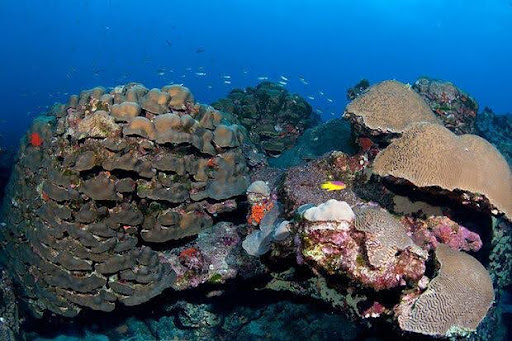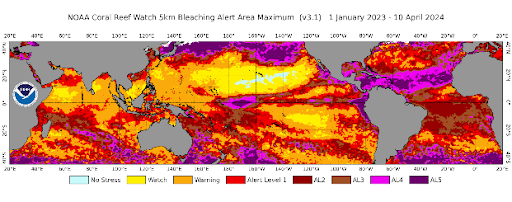Coral Reef Consciousness Week happened throughout the globe through the week of July 15 as an annual reminder of the significance of those underwater ecosystems. However seeing as how these buildings are essential to each the waters they name dwelling and to the land we dwell on, I might say they deserve way more consideration than they’ll get in simply seven days — particularly amid a warming world.
Past even their pure goal, these habitats are also extraordinarily essential for the economic system. They’re accountable for roughly $9.8 trillion annually globally; in the USA alone, the providers offered by coral reefs within the type of fisheries, tourism and coastal safety prime $3.4 billion yearly.
On the intense aspect, due to satellites, scientists have been capable of higher perceive these “rainforests of the ocean,” that are dwelling to almost 25% of our planet’s marine life, accounting for greater than 4,000 various kinds of fish.
Coral Reef Consciousness Week happened throughout the globe through the week of July 15 as an annual reminder of the significance of those underwater ecosystems. However seeing as how these buildings are essential to each the waters they name dwelling and to the land we dwell on, I might say they deserve way more consideration than they’ll get in simply seven days — particularly amid a warming world.
Associated: Beavers are serving to combat local weather change, satellite tv for pc information reveals

Past even their pure goal, these habitats are also extraordinarily essential for the economic system. They’re accountable for roughly $9.8 trillion annually globally; in the USA alone, the providers offered by coral reefs within the type of fisheries, tourism and coastal safety prime $3.4 billion yearly.
On the intense aspect, due to satellites, scientists have been capable of higher perceive these “rainforests of the ocean,” that are dwelling to almost 25% of our planet’s marine life, accounting for greater than 4,000 various kinds of fish.
“One of many most important challenges earlier than satellites was the protection that we had of the seafloor. We wanted extra boat-based know-how resembling sonar to watch completely different areas nevertheless it was all the time patchy,” Andrea Rivera-Sosa, undertaking and outreach supervisor for the International Conservation Science program with the Coral Reef Alliance, advised House.com. “Sure areas had extra assets and maps and different areas that had been least explored had much less protection. Satellites carry new know-how to extend our protection with world maps.”
“If you use satellites,” Rivera-Sosa continued, “relying on the decision and picture kind, you will get a giant image of the extent of the reef. You are capable of see many parameters resembling watercolor, after which you may take that picture and course of it to see depth and its bathymetry amongst different parameters. If the water is inexperienced, there’s extra algae and if it is clear, it has fewer vitamins. We will additionally see how turbid — murky — it’s from suspended particles from rivers and different sources.”
![A globe of earth over a white background is circled by different illustartions of various satellites. This diagram shows the 9 satellites (5 geostationary [orange] and 4 polar-orbiting [blue], updated July 18, 2023) that contribute data to the daily global 5km satellite coral bleaching monitoring products.](https://cdn.mos.cms.futurecdn.net/Mx8vWo7HZYjGDbNUUrnSqG.jpg)
The Nationwide Oceanic and Atmospheric Administration (NOAA) was on the forefront in establishing a community for monitoring and learning world coral reefs. Within the yr 2000, the group truly created a program known as the Coral Reef Watch (CRW), and over the previous 20 years, partnerships grew amongst reef managers and researchers utilizing imagery and information from NOAA satellites, pc fashions, and real-time observations. Altogether, CRW actually helped scientists regulate the well being of the reefs in addition to any threats these habitats confronted from air pollution, local weather change and overfishing.
“We all know that coral reefs stay in deep trouble by ocean warming specifically, however we additionally know that decreases in coastal air pollution and will increase in reef fish shares may also help reefs turn into extra resilient in the long term,” Greg Asner, the director for the Arizona State College Middle for International Discovery and Conservation Science, advised House.com. “Because the director of the Allen Coral Atlas (ACA), we now have glorious monitoring of how our satellite tv for pc information streams are serving to folks handle and monitor coral reefs worldwide.”
“We common about 60,000 customers per yr and about 600 to 800 dataset downloads per thirty days,” Asner continued. “Our customers make choices utilizing ACA information on matters of marine spatial planning and safety together with 35 new marine protected areas and related designations since 2020. A lot of our customers additionally monitor water high quality and coral bleaching utilizing the ACA — the one world close to real-time supply for this data on Earth.”

Again in April, the NOAA shared that, for the fourth time in recorded historical past, a world coral bleaching occasion is underway. Imagery and information from satellites offered scientists and researchers with affirmation of the occasion and the areas by which coral was beneath essentially the most stress from these traditionally heat ocean waters.
A fleet of watchful eyes from house can detect modifications in location temperature on a relatively massive scale, even in distant areas that, up to now, posed a problem when it got here to acquiring information. This is only one instance of how satellite tv for pc imagery retains the globe up-to-date on impacts related to local weather change, permitting scientists to raised perceive our planet, determine issues and push for constructive change and adaptation.
“We’re all related to the ocean, a method or one other. Satellites have additionally helped present data on the impacts of local weather change at a stage that we did not have earlier than. Satellite tv for pc information offers help on sea floor temperature, sea stage rise, bleaching, and it can also present data on ocean acidification,” Rivera-Sosa mentioned. “Oceans assist regulate our local weather; they’re absorbing all this power produced by us, people. If we carry on heating our system, then our oceans turn into hotter and lose their potential to manage our local weather. We’re seeing large coral bleaching occasions and stronger, extra intense hurricanes. And this has an influence on us, wherever we dwell”



